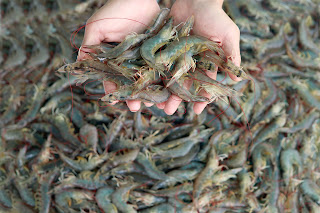A new project to facilitate sustainable shrimp production in the UK has just received a multi-million pound funding boost. The project, which will be led by experts from the University of Exeter in collaboration with the University of Reading and Rothamsted Research, will be looking to establish sustainable shrimp farming in the UK.
The UK£2 million in funding was given by the UK Research and Innovation (UKRI), as part of its Strategic Priorities Fund (SPF), which aims to increase research and innovation and respond to opportunities accordingly. This is part of the UKRI's UK£14 million injection into research that values human health and the environment.
Professor Rod Wilson from Exeter's Biosciences department will be the project's lead, titled "Transformational blueprint for a blue economy on UK terrestrial farms: integrating sustainable shrimp production in a changing agricultural landscape.'" Alongside Professor Wilson will be Professor Ian Bateman from Exeter's Land, Environment, Economics and Policy (LEEP) institute.
Traditional production methods for shrimp rely on unsustainable practices, such as the destruction of mangrove forests that are key in the removal of CO2. Overseas production methods can lead to local biodiversity problems and the shrimp containing residue that proves harmful to human health. By aiming to establish the UK as a "terrestrial blue economy," the project will be aiming to demonstrate the health and environmental benefits of indoor, home-grown shrimp.
This will be done by introducing a risk-free, healthier and sustainable supply chain for consumers and encouraging terrestrial farms in the UK to implement practices that aren't harmful to the environment and human health. Shrimp farming production will be co-located with renewable energy sources across a number of existing Anaerobic Digestor (AD) plants in the UK.
The hope is that if 20 percent of these AD plants are adapted for shrimp farming, 960 shrimp production units could be in play, along with harvesting 5520 tonnes of shrimp per year, which currently makes up 25 percent of UK warm water shrimp imports.
"In the UK we love eating shrimp (king prawns) as a healthy, high quality and tasty seafood," explains Professor Wilson. "This project aims to transform practices on UK terrestrial farms to encourage the integration of home-grown, indoor shrimp production alongside anaerobic digestors (AD) that use farm waste to make renewable energy. These AD also generate a lot of heat which is otherwise wasted, but tropical king prawn farms can utilise this heat to make their production cost-effective in the UK. This simultaneously means we will have better control over both their nutritional quality and the environmental impact of their production."
The project will be seeking to generate data that evaluates the potential of sustainable UK shrimp production which utilises renewable energy technology and lessens the environmental impact.
"By providing a new income stream for farmers which requires far less land than conventional farming, the 'terrestrial blue economy' of prawn production frees up farms to take advantage of grants under the new Agriculture Act for enhancing biodiversity, reducing carbon emissions, improving water quality and providing recreational access to the environment," says Professor Bateman.
Professor Guy Poppy, Programme Director of the Transforming the UK Food Systems SPF Programme says, "The food system affects all of us every day and plays an essential role in both human health and the health of the planet.
"The 11 new projects joining our consortia and CDT means we now have a network of more than 37 UK research organisations across England, Scotland, Wales and Northern Ireland."
Concluding, he said that the research being conducted "can be tried and tested across the global food system, with the UK leading the way towards healthier and more sustainable food for all."
The Aquaculturists


No comments:
Post a Comment